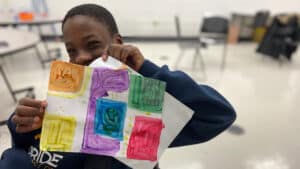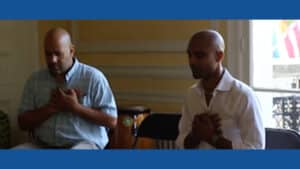STORY #11: Miss Intention
Miss Intention is a powerful music video shining a light on the injustices many students—particularly Black girls—face inside school systems that use punitive discipline measures like detention and suspension.
Miss Intention poses the question to educators: “When she’s crying out for attention, your response is detention. What if we stop to listen for a minute with intention?” The lyrics imagine a world where educators listen to reveal the root of a student’s pain, and instead provide space for emotional support, mindfulness and healing.
Understanding the backstory
The music video takes viewers inside a day-in-the-life of a young Black girl who’s navigating a very difficult time in High School. It’s a story that’s not uncommon for young women just like her.
She wakes to find herself the victim of cyberbullying as a viral video exposes intimate details of her relationship to her entire school community. Without time to process her pain, she’s confronted by her angry mother, yelling about household chores. In a frenzy, she skips breakfast and rushes out to school. Along the way, she’s sexually harassed and verbally assaulted. Without a moment to process her feelings, she arrives at class and her teacher approaches looking for homework—she realizes she’s forgotten it. As the teacher scolds her, she feels belittled and embarrassed. In a fit of rage, she storms out.
This experience, unfortunately, is a reality for many students in the school system. In order to understand the roots of their behavior, we have to dig deeper into the pressures they’re experiencing and the pain they’re feeling. Many schools miss the mark on meeting the social-emotional and mental health needs of their students. OCU sees a need for a different type of support, hence the #IntentionNotDetention mission took off!
We can’t just “punish without process”
Miss Intention mirrors some of the real-life experiences our Fly By Light students have faced. Recounting their stories, the film shows what happens when we “punish without process” and explores the difference we can make when schools strive to become more than just a place for academic instruction but also for student wholeness and well-being.
The film invites the audience to walk in this young lady’s shoes and ask themselves, “what would be the best approach or response when faced with a myriad of traumas all at once—all the while, trying to be present and engaged at school?” The answer is, we can improve these conditions by creating a safe space for social-emotional learning and self-reflection.
Honoring Black culture in History class
As we celebrate Black History Month, we question how the events we’re facing today tie into a broader historical context, especially as it relates to the teaching of Black history and the treatment of Black bodies. We have not taken enough of a deep dive into the cultural implications of these school behavioral systems. Data shows Black and brown youth are disproportionately suspended or sent to detention. Historically, they’ve been more likely to be viewed as having “behavioral problems.”
There are many ways in which this ties into Black history and we tried to address some of them with Miss Intention. Specifically, the moment in the video where the teacher asks the student for her homework on Rudyard Kipling, the author of the poem, The White Man’s Burden. This is a subtle, yet poignant, reflection on how cultural insensitivity in our approach to history can also impact a student’s desire to learn.
When it comes to history, we rarely examine how the perspective it’s written from can be the source of trauma in itself for Black students. Continually learning about being oppressed can be just “like seeing viral videos of Black people shot multiple times by police officers.” Often the student’s angst towards learning is misinterpreted as insubordination, disruptiveness or non-compliance, when the reality is it’s a much deeper feeling they’re experiencing. We have a long way to go to be inclusive of the full-spectrum of Black culture in our history.
Another cultural problem we address in the film is the propensity to police Black girls more often over their style of dress and hair. Miss Intention challenges the audience to look at internalized and institutionalized racism that’s present in our school systems. From the hypersexualization of Black women and girls’ bodies to the lack of cultural awareness and diversity, we seek to inspire people to make Black history a part of world history and engage all students to embrace Black culture and the Black experience as a normal part of curriculum taught throughout the year—not just a highlight during February or after a crisis.
Seeing the world through the lens of Black women
I relate so much to the character in the video because of my own girlhood and teenage experience. I see parts of myself in many of my students, especially the girls, and I’m very aware of the many unseen challenges they’re facing. There are certain formulas or sets of experiences that create a cycle or systems of trauma that can disrupt education, especially for young girls of color.
This includes high levels of stress; unresolved or unhealthy conflict with parents; sexual harassment, assault, and rape; and unprocessed trauma that shows up in classrooms or peer relationships. Unfortunately, as a result, the norm is that punitive measures are used to punish or as an attempt to “control” the teen. This is where the criminalization of Black girls begins.
Through the film, I hope people will feel compassion for youth—especially black and brown youth—and feel a deep need to change our current educational system’s behavioral responses. Recognizing the unprocessed trauma our youth may be carrying, the video serves as an entry point to inject some baseline solutions that can be used in school and in life.
Community Conversations
Join us on February 17 at 5 pm EST for a community conversation around this topic. From mothers and daughters to teachers and students, mental health professionals, and community activists, we’ll come together to have a candid conversation around the various factors disproportionately affecting our young women of color. This event will be facilitated by Mama Princess; Samaria, the student featured in the film; an OCU Mental Health Practitioner; and it will be moderated by Kimberley Williams, the Producer of the film and mother as well.

Finding inner-peace and prioritizing self-care
To activate the healing center within ourselves, we must have a sense of joy, bliss, peace, balance, focus, and gratefulness to reduce the likelihood of leaning into the systems and cycles that keep us from flourishing. For our students, we want to remove any and all blockages that keep them from being their highest selves—so education, home, and life become an enjoyable experience.
~ The Healacist, HipHopMomma, Princess Best
Bringing intention into practice
An outcome of OCU’s “IntentionNOTdetention campaign has been our newly piloted Intention Room program that provides a safe space for students to process, reflect, redirect and be accountable for what they’re experiencing. Where students have the opportunity to express themselves in group discussion, create art to explore their feelings, and practice mindfulness for emotional balance and conflict resolution. By focusing on improving their wellbeing, we also improve their ability to engage in class, and ultimately improve their educational outcome.
STAY TUNED for STORY #17 – THE INTENTION ROOM
Where to find me:
Promo Video: HipHopMomma: Engaging Empowerment Girls & Women Keynote Speaker & Performing Artist Educator
Short Documentary: A Mother’s Day Healing: The HipHopMomma Princess Best Short Documentary
My Book: My BARZ Heal Scars: The WombPrint To Healing The Girl Within (Hip Hop Healing Book & Music Download)
My Instagram: The Healacist
My Facebook: The Hiphopmomma Princess Best – “The Healacist”
Miss Intention is also available on:
Additional Resources:
Pushout by Monique Morris, and the documentary Dark Girls and Light Girls.






